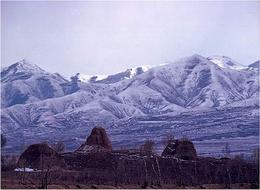
Glacier and snow coverage on Qilian Mountains, known as the lifeline of Gansu Corridor, has been shrinking drastically as a result of rising temperatures linked to global warming, a CAS researcher found recently with his team.
Seated to the south of Hexi Corridor in northwest China, Qilian Mountains is one of the areas with the most concentrated glaciers in China. Snow above 5,000m altitude is the source of many rivers.
Satellite remote sensing data shows that glacial coverage in the Qilian Mountain area has retreated by 8.2 per cent from 1956 to 2000. Heihe basin has seen the most recession, 24.3 per cent. Some areas are dwindling by 10 per cent, such as Bayan Gol River and Datong River, said Liu Shiyin from the Cold and Arid Regions Environmental and Engineering Research Institute (CAREERI), CAS.
Glaciers play a crtical role on the local human activities, economic development and ecological environment. Oases in the areas have shrunk due to shortage of melting water, leading to deteriorating ecological environment of the Hexi Corridor, said Xu Junli, also a CAREERI researcher.
More than 80 per cent of West China's glacial areas are retreating in the late 50 years by 2 per cent to 18 per cent. The rise of snow line at a speed of 2 to 6.5 metres per year will kill small glacial less than 2 square kilometres in 50 years, according to experts.
Related News
Photos
More>>trade
market
finance
- China Unearthed Oldest Known Ancestor of Birds
- IMHE and Chongqing University Sign Science and Technology Strategic Cooperation
- CAS Vice President Inspects CSNS and Daya Bay Reactor Neutrino Experiment
- Dinosaurs with Bird-like Wrists
- IMHE Makes New Progress on UAV Aerial Remote Sensing Technology and Application





